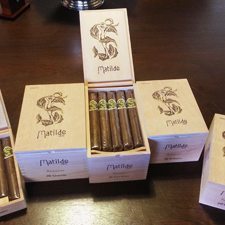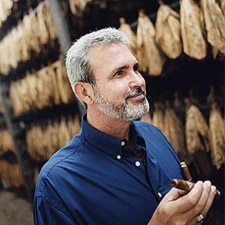Source: Cigar Aficionado
José Seijas, a member of the Cigar Aficionado Hall of Fame with nearly 60 years of experience in the cigar industry, is poised to launch a cigar brand called Matilde. The Dominican smoke is the first new cigar brand created by Seijas since he retired from Altadis U.S.A. Inc., in 2012.
As the vice president and general manager of Altadis‘s Tabacalera de Garcia Ltd., factory, Seijas oversaw the production of 60 million cigars a year, including such famous brands as Montecristo, H. Upmann and Romeo y Julieta. After retiring, he set up a much smaller factory in La Romana, not far from Tabacalera de Garcia, intent on making cigars on a smaller scale. Seijas joined with brothers Charlie and Rubin Gonzalez who have long sold cigars in the Dominican Republic and also organized tours in La Romana. The three partners created New World Cigars, and their factory in La Romana opened last September.

The factory in La Romana run by Seijas has only a handful of rollers. The goal of New World Cigars was to create a destination for the brisk tourist trade in the town, located in the southeastern Dominican Republic. Seijas’s factory and Tabacalera de Garcia are the only cigar factories of note in La Romana, which is located roughly a four-hour drive (not counting traffic) from the Dominican cigarmaking capital of Santiago.
The first project for Seijas was a joint venture of sorts with Litto Gomez, the maker of La Flor Dominicana cigars, to produce some of Gomez’s cigars in the new factory La Romana. Now Seijas has created a brand of his own.
Ricardo Seijas, who is working with his father, said the Matilde brand pays homage to the cigarmaking tradition of the Dominican Republic. “When deciding the name to use, we wanted something that had deep roots in the Dominican Republic, that carried some tradition, my father being such a traditional person himself. Looking through old archives for inspiration, our team hit upon La Matilde, and when we did a preliminary registration check we saw that this very old Dominican brand was available. We hired a historian to dig up everything he could about La Matilde and what was happening in the Dominican Republic and Santiago during its period. With time, we realized we struck gold with Matilde‘s rich history and bought the rights for the brand.”
Seijas said Tabacalera La Matilde was founded in 1876 in Santiago, and that the factory went under after the death of founder Simeon Mencia around 1910. Despite its short tenure, Seijas said the factory carried importance. “The original building of the factory still stands today in Santiago in Calle de las Rosas. Simeon’s old house and the original factory were considered city landmarks during its time in Old Santiago, due to their beautiful architecture. The Mencia family was well known, too, given that their coming and going in Santiago was newsworthy as shown by some of the newspaper clippings of the time.”
The Seijas family shortened the brand name from La Matilde to Matilde. They said they were going to name their factory Tabacalera Matilde sometime in 2014.
The cigars have a heart of Dominican filler, with a touch of Nicaraguan leaves in there as well as a Dominican binder. They are covered by Ecuadoran Habano wrapper. “Matildes are made using only one cut to the leaf, by the edge of the leaves, and away from the heavy veins,” said Jose Seijas, who said the move made the cigars more attractive and also mproved the burn. “The cigars are wrapped with the same wrapper cut from the tuck to the heads. The finishing of the cigar head is done with the same piece of wrapper as well.”
Seijas has also insisted on hiring cigar rollers who smoke cigars, a move he thinks makes for a superior end product.
“Our tabaqueros are cigar smokers, this way they have knowledge of use of the product,” he said. “The knowledge of use is an important part of quality control.”
Matilde comes in four sizes, two of them traditional, and two designed for the modern trend toward larger cigars. There is a Corona measuring 5 1/2 inches long by 44 ring gauge, which will carry a suggested retail price of $6.50; a Robusto (5 1/4 by 54, $7.50), Toro Bravo (6 1/2 by 54, $8) and Grande (6 by 60, $8.50). They are aged for 90 days after rolling.
José Seijas said that shipments could begin as early as the next two weeks or so.




